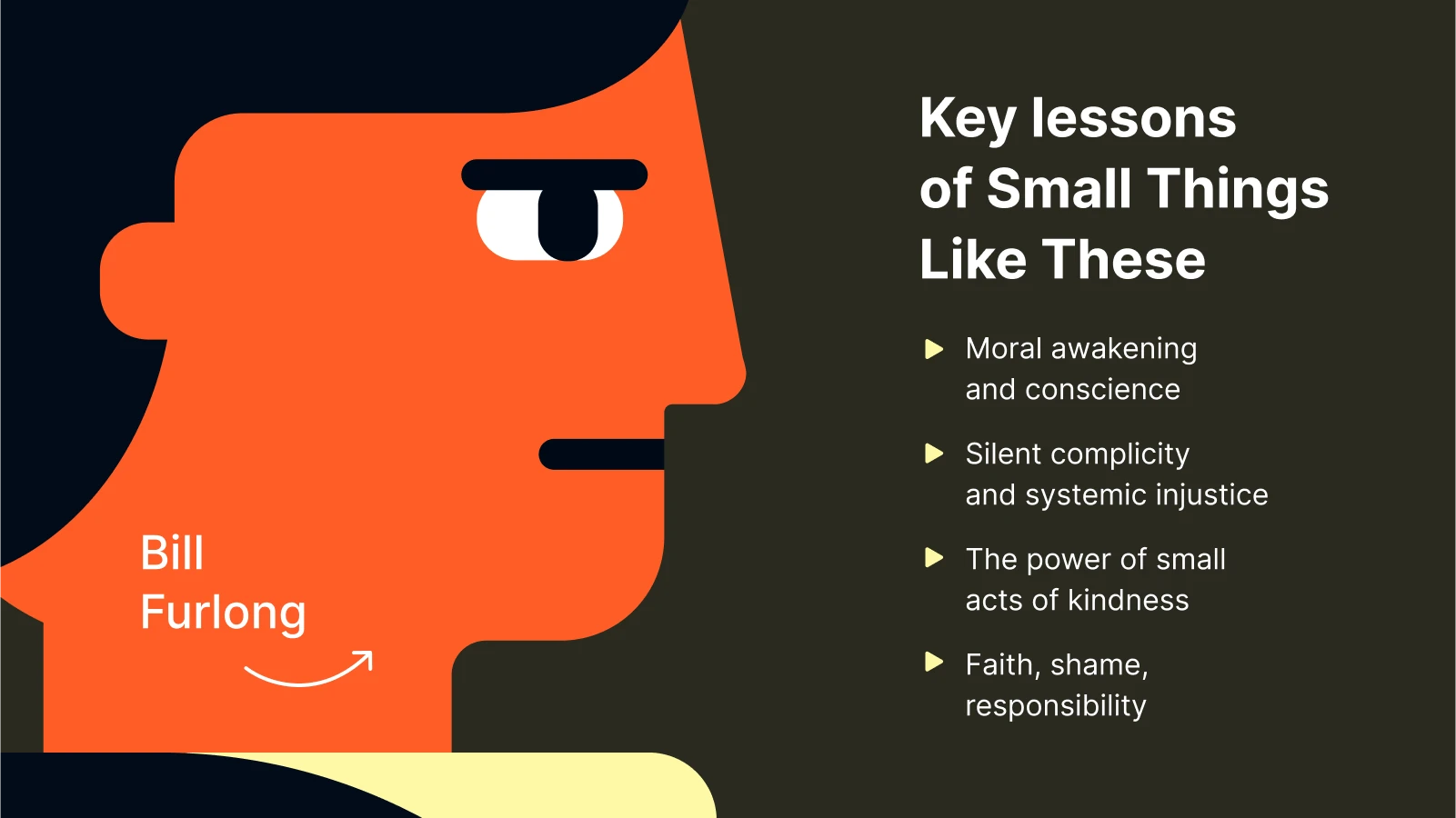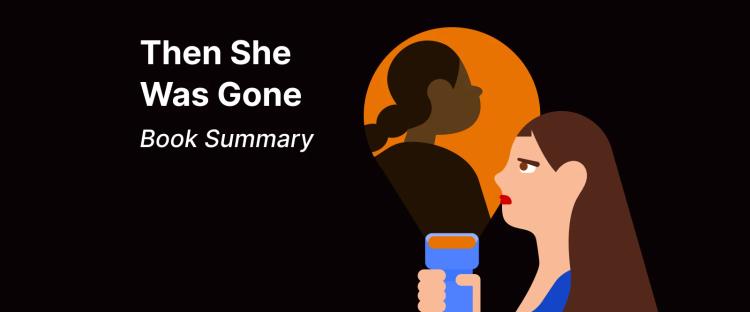"Was there any point in being alive without helping one another?" Claire Keegan's 'Small Things Like These' is a hauntingly beautiful historical fiction novella that explores the quiet heroism of one man's moral awakening in a society immersed in silence and complicity.
"It is a sublime, emotive story, the kind you emerge from as if having been away for a very long time: unsure, at first, how to continue with your own life." — The Guardian.
In the 1980s, times were tough for farmhands and ordinary people in Ireland, especially because of an economic downturn. Villagers and small-town citizens are struggling to make ends meet.
Some are here broken, and they are being forced to leave their homes in search of better jobs in big cities, such as Dublin and Limerick. Continue reading, as we analyze the 'Small Things Like These' story from all its perspectives and depth levels.
Looking for more stories filled with powerful emotions and twists? The Headway app features over 2,000 engaging summaries, all designed to be a part of your daily growth routine.
Join 50+ million users who make learning and inspiration part of their day and download Headway.
What is 'Small Things Like These' about?
Set in 1985, in the small Irish town of New Ross during the weeks leading up to Christmas, 'Small Things Like These' follows Bill Furlong, a coal and timber merchant and father of five daughters. Furlong is a quiet, decent man who works hard to provide for his family and maintain a modest but stable life.
Bill is the son of an unmarried mother who worked as a maid for Mrs. Wilson, a kindly Protestant widow who showed them both compassion. Bill's mother taught him to be kind during his childhood, so he carries a deep sense of gratitude and empathy. During a routine delivery to the local convent, Furlong stumbles upon a young girl locked in a coal shed. The child is cold, frightened, and clearly being mistreated.
The convent, a facility operated by nuns, is part of the Magdalene Laundries system. This institution was notorious for abusing "fallen women." Furlong's discovery leads him to a moral crisis: should he speak out and risk being alienated, or stay silent like everyone else?
This literary fiction story unfolds with quiet tension as Furlong wrestles with his conscience, the expectations of his community, and the legacy he wants to leave for his daughters. Keegan's storytelling is emotionally resonant, capturing the weight of small decisions in a world where silence often equals survival.
Enjoy stories with moral dilemmas in harsh environments? Check out our review of 'The Great Alone' — this one also explores the theme of making decisions in challenging circumstances.
What are the key themes and lessons of this must-read?
Claire Keegan's novella is brief in length, but it is definitely rich thematically. Through Bill Furlong's life and the realities of 1980s Ireland, 'Small Things Like These' demonstrates profound moral and social matters. We've captured in this book review the central ideas that shape the emotional and ethical core:
Moral awakening and conscience: Bill Furlong's moral awakening is the heart of the novella. He's the man who values decency, but what he encounters makes him rethink everything. Bill's decision to act is quiet but courageous, which reflects the complexities of human behavior.
Silent complicity and systemic injustice: This novella illustrates how systemic abuse thrives in silence and complicity. The townspeople are aware of the convent's reputation, but still choose not to speak out against it.
The power of small acts of kindness: Keegan's title underscores the transformative power of small gestures. Furlong's kindness is deeply human. The novella suggests that change doesn't always come from grand gestures. Sometimes, it begins with one person choosing compassion over convenience.
Faith, shame, and responsibility: The convent is revealed to be a site of cruelty and control. The townspeople's reverence for the Church is mixed with shame and fear, particularly around issues of sexuality and motherhood. Furlong was raised by a single mother, which makes him more empathetic but also more vulnerable to the judgment of others. The book explores how faith can be both a source of strength and a tool of oppression.
Understanding Bill Furlong's struggle: A Character at the Crossroads
Bill Furlong is a coal merchant in a small Irish town, quietly going about his life in the weeks leading up to Christmas. He's a man shaped by modesty, routine, and a deep sense of decency, qualities instilled in him by his own mother and reinforced by his wife, Eileen, who often urges him to stay practical and avoid trouble.
But when Furlong delivers coal to the local convent and encounters Sarah, a girl locked in a shed, he's forced to confront the moral rot beneath the town's surface. The mother superior, representing the institutional power of the Church, tries to dismiss the situation with cold authority.
Furlong's decision to intervene places him at a moral crossroads: remain silent like so many others, or risk his livelihood and reputation to do what's right. His resolution becomes clear on Christmas Eve when, between Christmas cakes and Christmas carols, he chooses to take action.
His role as a coal merchant becomes symbolic. He brings warmth to homes, yet must now bring light to a place of hidden suffering. Bill chooses compassion, which makes him a quiet hero of the story. This is a matter of fact that even small acts of courage can break unfair systems.
Similar to the broken trust explored in our article, Furlong's struggle highlights the devastating impact of silence within institutions. His choice to act, despite the risks, mirrors the emotional cost of broken trust in any system.
📘 Lead with moral courage with Headway.
Historical context: Magdalene Laundries & 1980s Ireland
The Magdalene Laundries are the Catholic religious order institutions in Ireland, where young women deemed "fallen" were forced into unpaid labor. These laundries operated from the 18th century until as late as 1996, and were supported by both the Catholic Church and the Irish state.
Many women suffered physical and emotional abuse, and their children were often taken from them. In the 1980s, Ireland was still profoundly influenced by Catholic doctrine, and the Magdalene Laundries remained largely unquestioned.
Keegan's novella is set during this time, when the Church's authority was rarely challenged, and social norms were rigid and unforgiving. It means a lot for Irish history, as the author talks about a dark chapter of the Irish people and lets readers reflect on silence and the courage required to speak out.
Critical reception and author background: 'Small Things Like These' by Claire Keegan
Claire Keegan is an acclaimed Irish writer known for her emotionally resonant and minimalist prose. Born in County Wicklow, she studied at Loyola University in New Orleans at age 17. Then she returned to Ireland in 1992, and later lived in Wales as she pursued her MA in creative writing. These experiences shaped her literary voice and perspective.
In interviews and podcasts, she has discussed her experience of writing a book, the impact of rural Irish life on her stories, and the moral complexities she explores through her characters.
Keegan's previous works, including 'Foster' and 'Antarctica,' have earned her a reputation as one of Ireland's finest contemporary authors. With 'Small Things Like These,' she has created a narrative that is both intimate and politically charged.
What awards and recognition has Claire Keegan received?
Claire Keegan's writing is known for its emotivity, elegance, and ethical themes, which she often includes in her stories. Here are some of the awards she received as an author:
The Orwell Prize for Political Fiction (2022) for 'Small Things Like These.' Critics praised this story for its powerful and poetic critique of institutional abuse and the way it confronts historical injustices.
Shortlisted for the Booker Prize (2022): The same book was shortlisted for one of the most prestigious literary awards. Even the simple nomination demonstrates her ability to craft concise narratives, in addition to her full-length novels.
Winner of the Davy Byrnes Award (2009): Her novella 'Foster' received this literary prize. The story was celebrated for its lyrical prose and emotional subtlety.
Rooney Prize for Irish Literature (2000): This early-career award recognized Keegan's exceptional promise as a writer. It is given to emerging Irish authors whose work shows outstanding literary talent.
Edge Hill Prize for Short Stories (2008): 'Walk the Blue Fields' won an award that celebrates the best collection of short stories published in the British Isles. This recognition helped solidify Keegan's reputation as a true master of literary minimalism.
Keegan's writing is recognized for its careful craftsmanship and emotional impact.
'Small Things Like These' film adaptation and further influence
In 2024, Claire Keegan and Enda Walsh worked together on the Lionsgate adaptation of 'Small Things Like These.' It was directed by Tim Mielants and premiered at the Berlin International Film Festival.
The movie also featured Emily Watson and the famous Irish actor Cillian Murphy (as Bill Furlong). And while the novella itself is reflective, Cillian Murphy's performance infuses depth into Furlong's character.
The movie has the visual depth and emotional feel that reflect the moment described only in the pages of the book. Mielants brings out the book's ambiguous themes more strongly in the movie, while still staying true to the author's original vision.
The film has sparked renewed interest in the Magdalene Laundries and has been praised for its sensitive handling of historical trauma. It is sort of a tribute to Keegan's work and a powerful standalone piece of art.
📘 Explore storytelling impact with Headway.
Key reflection and discussion prompts for 'Small Things Like These'
This novel invites deep reflection and conversation. Its quiet power lies not just in what is said, but in what is left unsaid, making it an ideal choice for book clubs and group discussions. For a meaningful discussion and reflection, whether you're reading alone or with others, the following questions may help:
How does Bill Furlong's choice demonstrate the meaning of courage?
How does the author frame winter and Christmas to intensify the emotions?
In what ways does silence develop as a character in this short book?
In what ways does Furlong's own history affect his choice toward the girl at the convent?
How does religion shape the values and fears of the characters?
Would you have made the same choice as Furlong? Why or why not?
How does the novella facilitate contemplation on your own moral limits?
Small things, big Impact: Start your Headway growth journey today!
Bill's judgment throughout the novella is painful; it somehow seems like Keegan beautifully balances the pain and tenderness of these family stories. Through its quiet protagonist and his moral choices, the 'Small Things Like These' challenges readers to consider the weight of silence, the cost of compassion, and the courage required to confront injustice.
Want to experience the same emotions as when reading 'Small Things Like These'? On Headway, you can explore hundreds of influential, similar nonfiction books that help you reflect, grow, and act with purpose:
'How to Stop Worrying and Start Living' by Dale Carnegie
'Talking to Strangers' by Malcolm Gladwell
'The Purpose Driven Life' by Rick Warren
'Leadership Is Language: The Hidden Power of What You Say' by L. David Marquet
'Difficult Conversations' by Douglas Stone, Bruce Patton, and Sheila Heen
Get concise insights from life-changing bookswith the Headway app. It has already been downloaded over 55 million times.
So, download Headway today and make self-growth your daily companion!
Frequently asked questions about the 'Small Things Like These' summary
What's the main theme of 'Small Things Like These'?
The central theme of 'Small Things Like These' is the moral struggle between silence and action. Bill Furlong faces the challenge of doing what's right when confronted with injustice, exploring the impact of small decisions in a world where standing up can come with significant personal cost.
What's the conflict in 'Small Things Like These'?
The conflict in 'Small Things Like These' is internal. Bill Furlong is torn between his desire to protect his family and his growing awareness of the suffering at the local convent. He must decide whether to speak out against the Church's abuse or stay silent to preserve his life and reputation.
Who's the protagonist in 'Small Things Like These'?
The protagonist of 'Small Things Like These' is Bill Furlong, a coal and timber merchant in a small Irish town. He's a quiet, hardworking man who faces a moral crossroads when he discovers the mistreatment of a young girl at a convent. His journey is about finding the courage to confront wrongdoing.
What happens at the end of 'Small Things Like These'?
At the end of 'Small Things Like These,' Bill Furlong decides to act. On Christmas Eve, he makes the decision to take an action that will jeopardize his reputation. His actions reflect a quiet yet powerful stand against the abuse he uncovered, emphasizing the importance of small acts of courage.
What's Bill's trauma in 'Small Things Like These'?
Bill Furlong's trauma comes from his troubled youth, being raised by a mother who worked for a caring Protestant widow. These situations shaped his view of empathy and guilt, especially when confronted with the suffering of others. This trauma causes him to hesitate when confronting authority, even though he has a strong moral compass.














